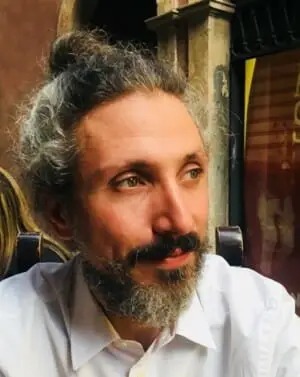Studying at the University of Verona
Here you can find information on the organisational aspects of the Programme, lecture timetables, learning activities and useful contact details for your time at the University, from enrolment to graduation.
Academic calendar
The academic calendar shows the deadlines and scheduled events that are relevant to students, teaching and technical-administrative staff of the University. Public holidays and University closures are also indicated. The academic year normally begins on 1 October each year and ends on 30 September of the following year.
Course calendar
The Academic Calendar sets out the degree programme lecture and exam timetables, as well as the relevant university closure dates..
| Period | From | To |
|---|---|---|
| Sem. 1A | Sep 23, 2019 | Oct 31, 2019 |
| Sem. 1B | Nov 11, 2019 | Jan 11, 2020 |
| Sem. 2A | Feb 17, 2020 | Mar 28, 2020 |
| Sem. 2B | Apr 6, 2020 | May 30, 2020 |
| Session | From | To |
|---|---|---|
| Sessione d'esame invernale | Jan 13, 2020 | Feb 15, 2020 |
| Sessione d'esame estiva | Jun 3, 2020 | Jul 25, 2020 |
| Sessione d'esame autunnale | Aug 24, 2020 | Sep 19, 2020 |
| Session | From | To |
|---|---|---|
| Sessione di laurea estiva | Jul 6, 2020 | Jul 11, 2020 |
| Sessione di laurea autunnale | Nov 2, 2020 | Nov 6, 2020 |
| Sessione di laurea invernale | Apr 7, 2021 | Apr 13, 2021 |
| Period | From | To |
|---|---|---|
| Festa di Ognissanti | Nov 1, 2019 | Nov 1, 2019 |
| Chiusura Ateneo | Nov 2, 2019 | Nov 2, 2019 |
| Festa dell'Immacolata | Dec 8, 2019 | Dec 8, 2019 |
| Vacanze di Natale | Dec 23, 2019 | Jan 6, 2020 |
| Vacanze di Pasqua | Apr 10, 2020 | Apr 14, 2020 |
| Festa della liberazione | Apr 25, 2020 | Apr 25, 2020 |
| Festa del lavoro | May 1, 2020 | May 1, 2020 |
| Sospensione delle lezioni | May 2, 2020 | May 2, 2020 |
| Festa del Santo Patrono | May 21, 2020 | May 21, 2020 |
| Sospensione delle lezioni | May 22, 2020 | May 23, 2020 |
| Festa della Repubblica | Jun 2, 2020 | Jun 2, 2020 |
| Vacanze estive | Aug 10, 2020 | Aug 15, 2020 |
Exam calendar
Exam dates and rounds are managed by the relevant Humanistic Studies Teaching and Student Services Unit.
To view all the exam sessions available, please use the Exam dashboard on ESSE3.
If you forgot your login details or have problems logging in, please contact the relevant IT HelpDesk, or check the login details recovery web page.
Should you have any doubts or questions, please check the Enrollment FAQs
Academic staff
 francesco.bianchi@univr.it
francesco.bianchi@univr.it
 bonifacio@teologiaverona.it
bonifacio@teologiaverona.it
 evita.calabrese@univr.it
evita.calabrese@univr.it
 andrea.cavalletti@univr.it
andrea.cavalletti@univr.it
 francesco.lupi@univr.it
francesco.lupi@univr.it

Mastrocinque Attilio
 attilio.mastrocinque@univr.it
attilio.mastrocinque@univr.it
 +39 045802 8386
+39 045802 8386
 linda.napolitano@univr.it
linda.napolitano@univr.it
 pieralberto.porcedducilione@univr.it; pierre_pordd@yahoo.it
pieralberto.porcedducilione@univr.it; pierre_pordd@yahoo.it
 045 8028732
045 8028732
 nicola.turrini@univr.it
nicola.turrini@univr.it
 lucia.vantini@univr.it
lucia.vantini@univr.it
 mariarenata.zanchin@univr.it
mariarenata.zanchin@univr.it
Study Plan
The Study Plan includes all modules, teaching and learning activities that each student will need to undertake during their time at the University.
Please select your Study Plan based on your enrollment year.
1° Year
| Modules | Credits | TAF | SSD |
|---|
Other activities2° Year activated in the A.Y. 2020/2021
| Modules | Credits | TAF | SSD |
|---|
1 module to be chosen between the following
1 module to be chosen between the following3 modules to be chosen among the following3° Year activated in the A.Y. 2021/2022
| Modules | Credits | TAF | SSD |
|---|
3 modules to be chosen among the following1 module to be chosen between the following| Modules | Credits | TAF | SSD |
|---|
Other activities| Modules | Credits | TAF | SSD |
|---|
1 module to be chosen between the following
1 module to be chosen between the following3 modules to be chosen among the following| Modules | Credits | TAF | SSD |
|---|
3 modules to be chosen among the following1 module to be chosen between the following| Modules | Credits | TAF | SSD |
|---|
2 modules to be chosen among the following3 modules to be chosen among the followingLegend | Type of training activity (TTA)
TAF (Type of Educational Activity) All courses and activities are classified into different types of educational activities, indicated by a letter.
General sociology (2020/2021)
Learning outcomes
Sociology Through a discussion of the main theoretical problems faced by the Durkheimian sociological tradition, the course aims at giving to students the knowledge of the mechanisms through which social order is constituted, reproduced and changed. Moreover, the course wants to transfer to students the skills necessary to understand and analyze the roles played by social structures towards subjects, deepening in particular those aspects concerning the influences exercised by different forms of cultural belongings and social memberships over the constitution of individuals identity. At the end of the course, students are expected to elaborate autonomous analysis and judgements about different cultural and social processes and their profound impact on the life of individuals.
Program
After having presented the main features of Durkheimian sociology, the course will focus on two of the most original innovators of this theoretical tradition, i. e. Erving Goffman and Pierre Bourdieu. On one hand, drawing on Goffman, we will discuss the social processes of construction of individuality and those regarding the ritual order of social interaction. On the other hand, drawing on Bourdieu, we will take into consideration concepts such as those of habitus, fields, symbolic capital and symbolic violence.
Prerequisites:
To fully understand the contents of the course it is not requested any particular knowledge, except some general notions of history of modern and contemporary philosophy.
CONTENTS:
Émile Durkheim
What is social order? The Durkheim's answer
Social sanctions and moral sanctions
The coercive nature of social facts and the role of emotions regarding social solidarity
Civil society, the State, and social solidarity
Religion, rituality and social solidarity
Erving Goffman
Being individual as a social fact;
the ritual construction of individuality: the face-work;
deference and demeanor as forms of self construction;
the ritual order and the social construction of reality;
the interaction order as a sui generis form of social order.
Pierre Bourdieu
The objectivism/subjectivism dilemma;
the interiorization of the social: the concept of habitus;
the exteriorization of the social: the concept of field;
the forms of capital: culture, economics, society symbols;
social order, social injustice and symbolic violence.
| Author | Title | Publishing house | Year | ISBN | Notes |
|---|---|---|---|---|---|
| Bourdieu P. | Campo del potere e campo intellettuale | Manifestolibri | 2002 | SOLO pp. 51-82 | |
| Goffman E. | Il rituale dell'interazione | Il Mulino | 1988 | Solo i primi tre capitoli: Giochi di faccia; La natura della deferenza e del contegno; Imbarazzo e organizzazione sociale | |
| Goffman E. | La vita quotidiana come rappresentazione | Il Mulino | 1997 | SOLO pp. 95-164 | |
| Durkheim É. | Le forme elementari della vita religiosa | Meltemi | 2005 | SOLO pp. 243-297 | |
| Durkheim É. | Le regole del metodo sociologico. Sociologia e Filosofia | Edizioni di Comunità | 1996 | SOLO pp. 23-57 e pp. 165-206 | |
| Durkheim É. | Lezioni di sociologia | Etas | 1973 | SOLO pp. 91-100 | |
| Goffman E. | L'ordine dell'interazione | Armando | 1998 | SOLO pp. 95-164 | |
| Bourdieu P. | Meditazioni pascaliane | Feltrinelli | 1998 | SOLO pp. 135-216 | |
| Bourdieu P., Wacquant L. J. D. | Risposte. Per un’antropologia riflessiva | Bollati Boringhieri | 1992 | SOLO pp. 66-135 | |
| Bourdieu P. | The forms of capital. In: J. Richardson, (ed.) Handbook of Theory and Research for the Sociology of Education | Greenwood. | 1986 |
Examination Methods
The final exam will consist of a written test. The candidate will have to answer to 4 open questions in 2 hours of time. Three questions will deal with the topics presented and discussed during the course. The fourth question will try to elicit the critical analysis skills of the candidates. More clearly, the students will be asked to provide a personal reflection on some topics treated during the course (a comparison, a critical comment, an empirical exemplificaton, etc.)
EVALUATION CRITERIA:
- the degree of comprehension of the discipline;
- the degree of comprehension of the single concepts;
- the capacity of presenting theoretical problems;
- the mastery of the disciplinary lexicon;
- the capacity to connect different topics;
- The capacity to provide powerful empirical exemplification of the theoretical concepts discussed.
Type D and Type F activities
Modules not yet included
Career prospects
Module/Programme news
News for students
There you will find information, resources and services useful during your time at the University (Student’s exam record, your study plan on ESSE3, Distance Learning courses, university email account, office forms, administrative procedures, etc.). You can log into MyUnivr with your GIA login details: only in this way will you be able to receive notification of all the notices from your teachers and your secretariat via email and soon also via the Univr app.
Student mentoring
Linguistic training CLA
Gestione carriere
Practical information for students
Documents
| Title | Info File |
|---|---|
|
|
pdf, it, 325 KB, 02/05/23 |
|
|
pdf, it, 212 KB, 02/05/23 |
|
|
pdf, it, 131 KB, 02/05/23 |
Graduation
Documents
| Title | Info File |
|---|---|
|
|
pdf, it, 99 KB, 13/10/23 |
|
|
pdf, it, 101 KB, 10/04/24 |







































